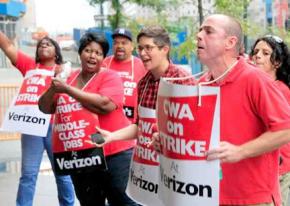Why teachers should support Verizon strikers
, an educator in Rhode Island, makes the case that teachers should go out and support striking Verizon workers on the picket line.
ON AUGUST 7, workers at Verizon up and down the East Coast went on strike. The workers, represented by the Communications Workers of America and the International Brotherhood of Electrical Workers are facing demands for more than 100 different concessions from one of the biggest telecommunications companies in America.
Among the concessions demand: elimination of job security, freezing pensions for current workers and eliminating them for future workers, replacing the current health care plan where workers pay no co-shares with a high-deductible plan that will cost workers thousands of dollars, and elimination of sick days and paid holidays for Veterans Day and Martin Luther King Day.
This from a company that made $10 billion in profits last year and paid its top five executives $258 million in salary and bonuses over the last four years. Verizon workers have a serious fight in front of them, and a win for workers will have important consequences for workers everywhere.
But does that include teachers? There are differences and divisions between workers at Verizon and teachers that should be overcome in the course of this strike if both wish to strengthen their position. This may at first seem counterintuitive, but the basic truth is that workers of all types have a common interest at this moment in pushing back against the austerity program of the bankers and their pet politicians in this country and internationally. This is an opportunity to do just that.

LET'S START with the differences in order to highlight the connections. On the one hand, teachers: the much-pilloried public workers, the highly paid, summers-off leeches off public tax money. Teachers have been subjected to a thoroughgoing ideological assault, a mass character assassination carried out by the paid stooges of the Walton Family, Bill Gates and Eli Broad, among others.
They have been subjected to the toughest job climate in memory--with mass layoffs, direct firings (against contractual language), pay cuts and attacks on pensions. This is all justified by the fact that the public sector is facing massive shortfalls in revenue and tremendous pressure to cut budgets. In addition, there is an increasing deskilling of the profession, as all curriculum is controlled from the top and directed at improving test scores.
Verizon workers are, of course, private-sector workers. Their company has been massively profitable. And while traditional telephone services are on the decline, Verizon has done much to expand into the wireless telephone and fiber-optic network sectors. While Verizon is trying to use the generalized economic crisis to push massive concessions, the money is clearly there, and the number of jobs (at least in the private sector) is growing.
But there is one particular element in common that should be taken seriously by all workers: the attempt to destroy the union. At Verizon, only 45,000 workers out of almost 200,000 are unionized, and those are mostly in the traditional "wireline" sector, which is on the decline. The wireless business, which for Verizon has been booming, is nonunion.
The idea here is to destroy the union's foothold so that the company can forge ahead into the growth sectors with a completely defenseless workforce. Sound familiar? This is exactly the playbook being used by the corporate education reformers and the Broad Academy bureaucrats in the public system. Teachers and communications workers are facing the same serious attack on their union rights, at the very moment when unions are what workers need the most.
There's another important element here, which is the notion of building solidarity.
This is extremely important for teachers in particular. The ideological assault on public-sector workers has no doubt made headway among private-sector workers, for whom the burden of taxation has grown in recent years. Therein lies the effectiveness of the hypocrisy: while the rich are paying lower taxes than at any time in the last three generations, their loud and unjustified complaints about having to pay taxes can have some resonance with people who actually do pay more in taxes--precisely because they, the rich, don't.
I remember one time when I was trying to distribute socialist literature to UPS workers. A driver--and drivers are generally older and more conservative--stopped and told me to "get a job." I explained to him that I had a job, that I was a state worker (this was before I was a teacher) in a union just like him. He exclaimed that this was even worse, as I leeched off his tax money, etc., and drove away.
So this is precisely the problem for teachers: we are portrayed in this negative light, and it will take real-life experiences with us for private-sector workers to overcome this indoctrination from the corporate media. That's why it's so crucial that teachers make every effort to get down to the picket line and support Verizon workers.
This is a rare and valuable opportunity to forge the kinds of links and build the real-life solidarity that we will need as we face a future of continued budget cuts, attacks on our salaries and benefits, destruction of the system we're working in, and really an all-out assault on the legitimacy of the public sector.
Yes, this affects the children of private-sector workers--and that is a factor pushing them to support us. But we need to take several steps beyond that, and show them that their kids are important to us--not just as our students, but as their children whose future is bound up with the struggle they themselves are engaged in right now.
So please: If you can get down to the picket line, by all means do so! And identify yourself as a unionized teacher and a fighter for the working class.
First published at Rhode Island Red Teacher.


